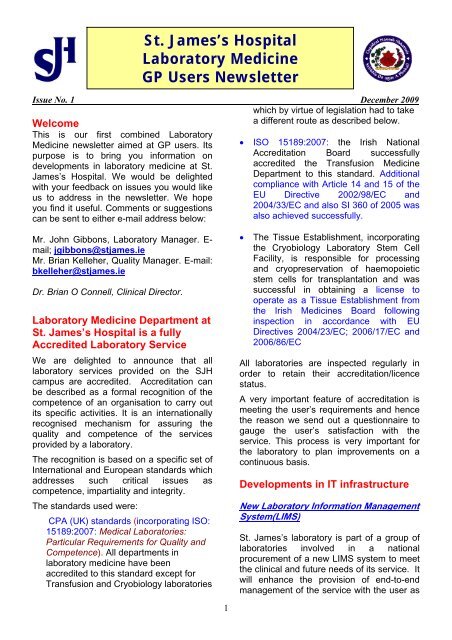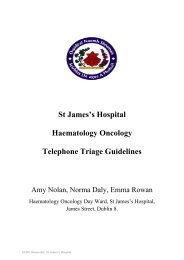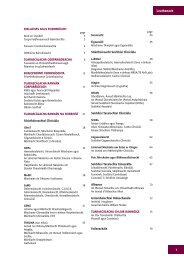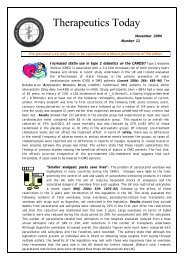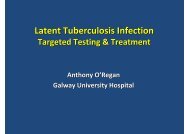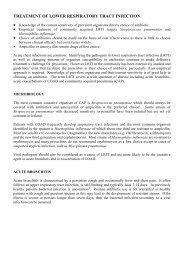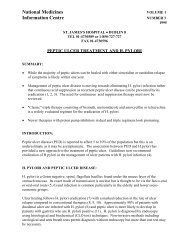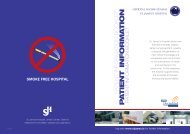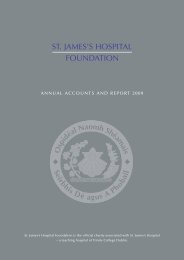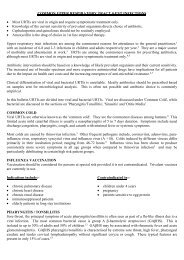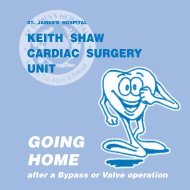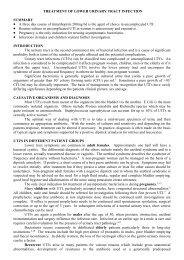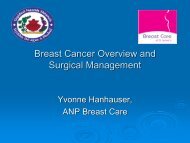GP User Newsletter Issue 1 (PDF 128Kb) - St. James's Hospital
GP User Newsletter Issue 1 (PDF 128Kb) - St. James's Hospital
GP User Newsletter Issue 1 (PDF 128Kb) - St. James's Hospital
Create successful ePaper yourself
Turn your PDF publications into a flip-book with our unique Google optimized e-Paper software.
WelcomeThis is our first combined LaboratoryMedicine newsletter aimed at <strong>GP</strong> users. Itspurpose is to bring you information ondevelopments in laboratory medicine at <strong>St</strong>.James’s <strong>Hospital</strong>. We would be delightedwith your feedback on issues you would likeus to address in the newsletter. We hopeyou find it useful. Comments or suggestionscan be sent to either e-mail address below:<strong>St</strong>. James’s <strong>Hospital</strong>Laboratory Medicine<strong>GP</strong> <strong>User</strong>s <strong>Newsletter</strong><strong>Issue</strong> No. 1 December 2009which by virtue of legislation had to takea different route as described below. ISO 15189:2007: the Irish NationalAccreditation Board successfullyaccredited the Transfusion MedicineDepartment to this standard. Additionalcompliance with Article 14 and 15 of theEU Directive 2002/98/EC and2004/33/EC and also SI 360 of 2005 wasalso achieved successfully.Mr. John Gibbons, Laboratory Manager. E-mail; jgibbons@stjames.ieMr. Brian Kelleher, Quality Manager. E-mail:bkelleher@stjames.ieDr. Brian O Connell, Clinical Director.Laboratory Medicine Department at<strong>St</strong>. James’s <strong>Hospital</strong> is a fullyAccredited Laboratory ServiceWe are delighted to announce that alllaboratory services provided on the SJHcampus are accredited. Accreditation canbe described as a formal recognition of thecompetence of an organisation to carry outits specific activities. It is an internationallyrecognised mechanism for assuring thequality and competence of the servicesprovided by a laboratory.The recognition is based on a specific set ofInternational and European standards whichaddresses such critical issues ascompetence, impartiality and integrity.The standards used were:CPA (UK) standards (incorporating ISO:15189:2007: Medical Laboratories:Particular Requirements for Quality andCompetence). All departments inlaboratory medicine have beenaccredited to this standard except forTransfusion and Cryobiology laboratoriesThe Tissue Establishment, incorporatingthe Cryobiology Laboratory <strong>St</strong>em CellFacility, is responsible for processingand cryopreservation of haemopoieticstem cells for transplantation and wassuccessful in obtaining a license tooperate as a Tissue Establishment fromthe Irish Medicines Board followinginspection in accordance with EUDirectives 2004/23/EC; 2006/17/EC and2006/86/ECAll laboratories are inspected regularly inorder to retain their accreditation/licencestatus.A very important feature of accreditation ismeeting the user’s requirements and hencethe reason we send out a questionnaire togauge the user’s satisfaction with theservice. This process is very important forthe laboratory to plan improvements on acontinuous basis.Developments in IT infrastructureNew Laboratory Information ManagementSystem(LIMS)<strong>St</strong>. James’s laboratory is part of a group oflaboratories involved in a nationalprocurement of a new LIMS system to meetthe clinical and future needs of its service. Itwill enhance the provision of end-to-endmanagement of the service with the user as1
well as the laboratory benefiting from theimproved IT infrastructure.<strong>GP</strong> Order Communications (OCM)through HealthlinkThis is a priority project for the laboratoryto enhance the quality of the service itprovides to General Practitioners. OrderCommunications involves two basicelements: Electronic requesting of laboratoryexaminations/tests Receipt of electronic reportsThe latter has been available for some timeto <strong>GP</strong>s and the electronic requesting hasbecome available since July 2009. A recentsurvey of <strong>GP</strong> users in microbiology foundthat more than 80% were satisfied with thequality of the layout and the timeliness ofreports. There are currently over 60 <strong>GP</strong>susing the system successfully. The benefitsof electronic requesting to the <strong>GP</strong> includethe following: Accurate transfer of information to thelaboratory and hospital informationsystem of patient data, requesting doctorand tests/examinations requestedFaster turnaround time for reportsElimination of potential transcriptionerrors in the current system, such as, inthe entry of tests requested anddemographic data. This avoids delays inreportsAvailability of patients results to theconsultant in <strong>St</strong>. James’s if patient isreferredNeed to follow up with telephoneenquiries for reports reducedThe benefits to the laboratory are the ease,which this system brings to the preanalytical processing of samples foranalyses. It will reduce the risk of errorsassociated with a manual system. Thisfacilitates the laboratory to continue to dealwith all <strong>GP</strong> work in an efficient manner andsubstantially enhances the quality andsafety of the service provided to <strong>GP</strong>s.The system can be used by <strong>GP</strong>s whether ornot they have an on site phlebotomyservice.2The laboratory is asking all <strong>GP</strong>s toembrace this project. It is offundamental importance for us as wecontinue to absorb increasing workloadwith decreasing resources.It is the objective of the Laboratory MedicineServices at <strong>St</strong>. James’s <strong>Hospital</strong> that all <strong>GP</strong>susing its services, electronically requestthrough Healthlink. The hospital is workingclosely with <strong>GP</strong>s and Healthlink to assist theearly transfer to the system. Its milestonesare 75% of <strong>GP</strong>s on the system by the end ofMarch 2010 and 90% by the end of 2010.<strong>GP</strong>s can seek more information and getlinked up by accessing the Healthlinkwebsite at www.healthlink.ie. Moreinformation can also be sought from JohnGibbons, Laboratory Manager (e-mailaddress above)Laboratory <strong>User</strong> WebsiteThe Laboratory updated its section of the <strong>St</strong>.James’s website in July of this year(www.stjames.ie/labmed) and now includesinformation on all aspects of the test/examination repertoire carried out in eachdepartment. In addition, it has informationon contact numbers for advice, and links toother relevant websites also. Information onpost mortems/autopsies is also accessiblefrom the hospital website at www.stjames.ie.Service DevelopmentsCytologyCervical cytologyThe National Cervical ScreeningProgramme has now been implementedthroughout the country. The NationalCervical Screening Service contractedQuest Diagnostics to provide cervicalscreening and as a result the department nolonger carries out cervical screening.General Practitioners sending otherpathological samples to CPL are remindedthat no cervical samples should be sent withthe green <strong>GP</strong> request forms. Any cervicalsamples for screening and reporting shouldbe sent directly to the Coombe Women’s<strong>Hospital</strong> accompanied by the Coombe’scytology request form.
<strong>GP</strong>’s requiring Coombe request forms cancontact: Noel Bolger, Chief Medical ScientistTel no. 01 4085618Post Vasectomy SamplesDue to restructuring of the cytology servicesat <strong>St</strong> James’s <strong>Hospital</strong>, post vasectomysemen sample analysis is no longer carriedout. <strong>GP</strong>s requiring this laboratory servicecan contact The Department of Pathology,The Rotunda <strong>Hospital</strong>, Dublin 1, on8171739.Biochemistry:Estimated GFR – a useful marker ofChronic Kidney DiseaseChronic kidney disease (CKD) is acondition, which may go unrecognised dueto its asymptomatic nature in many patients.Moreover, CKD is strongly associated withan increased risk of cardiovascular relatedmorbidity and mortality. The IrishNephrology Society has recently publishedguidelines for the identification,management and referral of patients withChronic Kidney Disease (CKD). Thisinitiative corresponds to similar initiativesrecently undertaken in other countries,including the United Kingdom and United<strong>St</strong>ates of America. A major featureunderpinning the Irish CKD Guidelines is theconcept of Estimated Glomerular FiltrationRate (eGFR), which is a useful measure ofrenal function and which can be calculatedin clinical laboratory practice using thefollowing patient data – plasma/serumcreatinine, age, gender and race. Since the1 st September 2009 the BiochemistryDepartment has calculated a value foreGFR on every request for plasmacreatinine received from clinical practitionersto facilitate the objectives of the Irish CKDguidelines. Each eGFR result isaccompanied by a detailed comment, whichshould help in the interpretation of the result.In addition to highlighting the potential useof eGFR as a marker of renal function theIrish CKD Guidelines also introduce themeasurement of protein/creatinine ratio in aspot (random) urine sample as a means ofassessing the extent of proteinuria in apatient. Moreover, the guidelines alsoindicate that urine dipstick tests continue tohave a value in stratifying patients in termsof clinical management. A detailed summaryof the Irish CKD Guidelines is available onwww.nephrology.ie.MicrobiologyExamining stool samples for ova, cysts andparasites is a very labour intensive processand because of decreasing resources and avery low positivity rate, we will only performthese requests if there is detailed clinicalinformation or the request has beendiscussed with one of the ConsultantMicrobiologists.3


